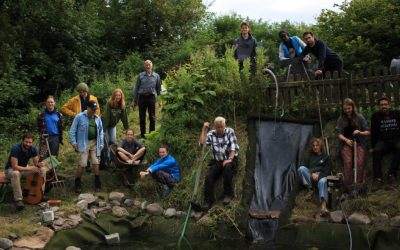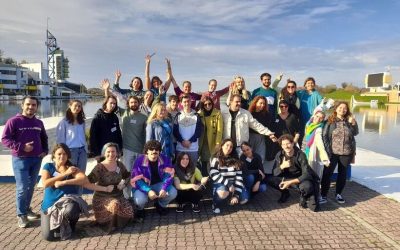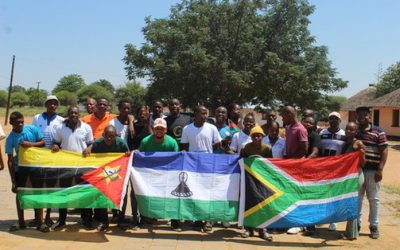SCI Hellas: Theater of the Oppressed
The 1st Experiential Workshop
In SCI Hellas we have long wanted to channel our actions on social inclusion through artistic tools and methods that open up new ways of interaction to build bridges and communities. So it is through the meta-covid19 –or perhaps during it still- that we undertook the step and we are organizing the 1st Experiential Workshop focusing on the theater of the oppressed applying techniques with theater tools.
The aim of the workshop is to acquaint the participants with the value, usefulness, and process of the Theater of the Oppressed, as initiated by Augusto Boal, in order to be able to apply it themselves in the future through experiential actions. The workshop ends with a live performance.
The workshop is purely experiential, however, the topics focus on oppression and emerge from the personal experiences of those involved. Its aim is for the participants to share various forms of oppression they might face, while the final form of oppression that will be presented will be related to a major social issue that will arise through workshop techniques and will result in the performance.
The techniques that are used concern the building of the team, the exposure, the confidence, the improvisation and the acquisition of the technique, in order for those involved to be able to use the Theater of the Oppressed as a means of resolving crises in human groups. During weekly meetings, the group will gradually be called to deepen into social problems that directly concern it and propose solutions. The workshop is innovative in nature and the activities suggested by the trainers of graded engagement and difficulty. From the individual to the sub-group, to the group as a whole and finally (through the final performance, the artistic/social result of the workshop) to the audience that will act as spectators (spectators-actors) and will participate in the process of resolving the “oppression” stunt presented.
The aim is for the participants to work through the activities in diverse groups and experience from the inside a Theater of the Oppressed, working with all the appropriate techniques and tools through the scheduled actions. The vision of this proposal is to create a workshop that will involve different people (professionals and volunteers who work or want to work with teams, social workers, youth counselors, trainers and educators of formal and non-formal education) who will share experiences while the concept of oppression will be presented in its various forms, aiming – ideally – at its elimination.
The duration of the workshop is 50 hours and will take place from September to December 2020.
Wish us to break a leg!
*In the title we play with the mathematical symbols + and : which in Greek read syn=plus and thia=divided/through and they both make compound words with μορφώνω (plural μορφώνουμε=give form/shape) to make the word συν-δια-μορφώνουμε meaning we give shape all together through our common work
**A few words on the Theater of the Oppressed (translated from Greek): The Theater of the Oppressed is a series of methods already introduced in the ’60s by the Brazilian director Augusto Boal (1931-2009). It is a social tool for reshaping power relations. It is the revolution of the theater. In his book “The Theater of the Oppressed” (“Teatro del Oprimido” 1974), Augusto Boal, influenced by Aristotle, states that since man is a political being, then everything is political. Every single one of our actions or non-actions is political. At the Theater of the Oppressed, everyone can do theater. It is a theater in which social transformation takes place and the roles of power are redefined. The spectator becomes an actor, shares, and participates. From spectators they become spect-actors. They interfere, ask, intervene, and take on the performance. The content of the events concerns social conflicts, oppression, inequality, and injustice that we see around us on a daily basis. Problems we are accustomed to going through without ever wondering how to solve them.
***The trainers are Konstantinos Marougkas, a writer, actor, educator, and theatrologist specializing in theatrical acting, text dramatization, the design and implementation of educational programs, and workshops, and Ioanna Tsakiri, an educator, actor and theatrologist specializing in working with young people.
Explore more news
ESC Workcamp Coordination from June to September 2024 in Germany!
Would you like to fill your summer with meaning and unique encounters? Then apply now and coordinate three workcamps from June to September in Germany! 🌞 With support by the European Solidarity Fund (ESC) SCI Germany is able to offer two European volunteers the opportunity to coordinate three workcamps in Germany with full accommodation and pocket money included! 🤝 The workcamps you are going to...
Call for Participants – Training Course on well-being in Poland
Call for youth workers, volunteers and NGO activists living in Bulgaria , Germany , Hungary , Ireland , Italy , North Macedonia , Poland , Portugal , Slovenia and Spain! SCI Poland has a great opportunity for you to join a free 7-day training course! This training will help you master your emotional and social intelligence so that you can increase your well-being and plan a better, happier life!...
Southern Africa Workcamps Cooperation
The Southern Africa Workcamps Cooperation was held from the 29th February to the 3rd March 2024 in Botswana, under the theme ‘Promotion of South-South Cooperation’ and hosted by the Botswana Workcamps Association In an endeavor to enhance self reliance, collaboration and the attainment of internationally agreed development goals (SDGs), Southern African Countries (Botswana, South Africa,...




